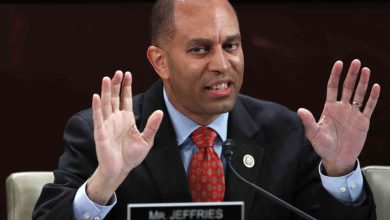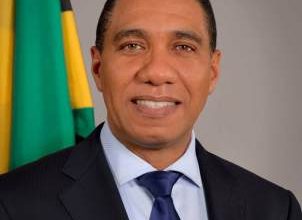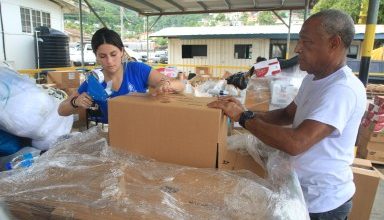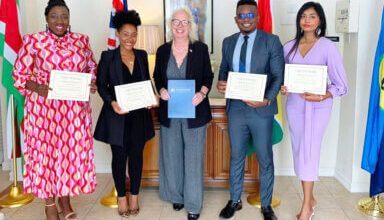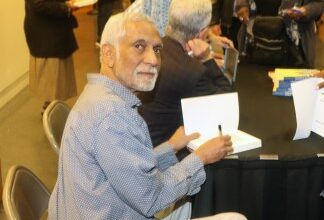World
Caribbean RoundUp
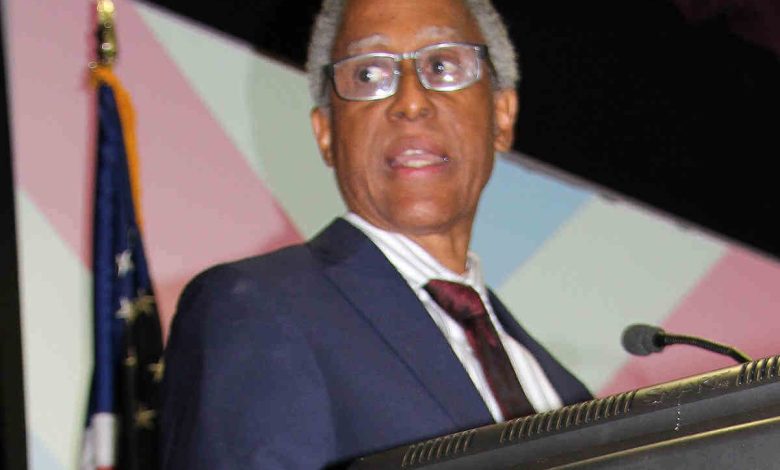
ANTIGUA
Antigua and Barbuda Prime Minister Gaston Browne last week called on two visiting members of Britain’s Royal family to assist the region in its fight for reparation against the slave trade.
Browne told the Earl and Countess of Wessex that they should use their influence towards building bridges towards reparatory justice.
Prince Edward, the youngest child of Queen Elizabeth and his wife are on a Caribbean tour to mark the Queen’s platinum jubilee.
Browne said while he understood that the Royal family as an institution are not involved in the discussions on reparation, human civilization should understand the atrocities that took place during slavery.
He told the Royal couple that the reality is “We have left bereft of important issues and good medical facilities,” acknowledging that in recent times Antigua and Barbuda has made “significant progress” with the establishment of The University of the West Indies (UWI) Five-Island campus.
Browne said while Antigua and Barbuda and the Caribbean have been able to build capacity to deal with the health sector, “again we have to acknowledge the fact that we have been left behind as a result of situations associated with colonialism and slavery and there is some need for reparation to help us build capacity so we can advance at a faster rate.”
BARBADOS
The Barbados government has extended the state of emergency (SoE) as the island deals with a new wave of cases linked to the COVID-19 virus.
Health Minister Ian Gooding-Edghill who piloted the Resolution on the Emergency Management Act in Parliament recently, said that the SoE would remain in effect until Sept. 22.
He said the move is necessary due to the uncertainty surrounding COVID-19 and the evolving variant.
Barbados recently confirmed the presence of the new Omicron BA.2 variant of the coronavirus as the island deals with a “dramatic” increase on the number of new COVID-19 cases.
The Health Minister said confirmation of the variant had come from the Trinidad-based Caribbean Public Health Agency (CARPHA) following the questions that have been raised regarding the dramatic increase in new Covid-19 cases and the possible existence of the new BA.2 variant in Barbados.
Barbados has recorded 388 deaths and 64,794 infections so far that is linked to the COVID-19 pandemic since the first case was detected in March 2020.
CARIBBEAN
The Caribbean Court of Justice (CCJ) President Adrian Saunders says it is disappointing should any Caribbean Community (CARICOM) country renege on its treaty responsibilities, preferring instead to have British judges continue to interpret its constitution and laws.
“Whether a state chooses to continue to have having Her Majesty’s Privy Council its final appeal is, of course, a fundamental constitutional question for that government and its people,” Justice Saunders told a Guyana Bar Association dinner culminating the inaugural Law Week in Guyana recently.
Speaking on the theme, “Advancing Caribbean Jurisprudence, Securing Sustainable Development Development,” Justice Saunders, the third Caribbean national to head the CCJ, which was inaugurated in 2005 as the region’s highest court to replace the London-based Privy Council, said every regional journalist who interviews a CCJ judge “inevitably asks us about those states that have not yet demonstrated the same faith, or that, for whatever other reason, have not yet acceded to our appellate jurisdiction.”
He said while Caribbean countries are free to make a choice regarding their final court, “it is a choice that has consequences.”
The St. Vincent and the Grenadines-born jurist said the governments and parliament of Guyana, Barbados, Belize, Dominica and hopefully St Lucia made a wise decision.
Guyana, Barbados, Dominica and Belize are the only CARICOM countries that are signatories to both the Appellate and Original Jurisdictions of the CCJ, which also serves as an international tribunal interpreting the Revised Treaty of Chaguaramas that governs the 15-member regional integration movement.
GUYANA
Guyana will host the next United Nations Food and Agriculture Organization (FAO) Regional Conference in 2024 after agriculture ministers from Latin America and the Caribbean agreed on the regional priorities that will guide the work of the FAO in the region during the next two years.
FAO director general Qu Dongyu said Latin America and the Caribbean can and must face its challenges and move to the forefront of global food and agriculture, adding that the world’s food security requires it.
He said the best way to do this is by transforming their agri-food systems to be more efficient, inclusive, resilient and sustainable.
Guyana’s Minister of Agriculture, Zulfikar Mustapha had co-chaired the recent FAO meeting in Ecuador.
HAITI
The Director of Israel’s National Burn Center at the Sheba Medical Center, Prof. Josef Haik recently arrived in Haiti to help patients who were badly injured when a fuel tanker crashed in the north of the country last December.
On Dec. 14 when the fuel tank crashed, it then exploded, killing more than 65 people and burning dozens of others as residents rush to collect the leaking gas.
Haik is leading the mission in corporation with the US Burn Advocates Network (BAN) to the hospitals that are still overwhelmed with the wounded.
Prior to departing Israel, Hail said the team is prepared to help many burn victims as possible.
“Unfortunately, a few months ago they had a big fire disaster and they still have injured patients that we need to treat. We’re going to do as many surgeries as we can to try and help their wounds”, he said.
Haik, who also heads Sheba’s division of plastic surgery and is a professor at Tel Aviv university, has previously brought his experience to Haiti.
In February 2020, on the tenth anniversary of the earthquake that devastated Haiti in 2010, Haik led an international team of burn surgeons, sponsored by BAN, to set up the first pediatric laser for treating disfiguring burn scars in children at Sacre Coeur Hospital on Milot.
JAMAICA
The Director of the Center for Reparation Research (CRR) at the University of the West Indies (UWI), Professor Verne A. Shepherd, has been reappointed chair of the United Nations’ Committee on the Elimination of Racial Discrimination (CERD).
CERD is the United Nation’s oldest treaty body and the committee implements the International Convention on the Elimination of Racial Discrimination.
Shepherd, whose candidacy was supported by CARICOM, is the first Jamaican to be a member of CERD and to serve as chair. She will be in the position for the next two years.
She has been a member of the committee since 2016, receiving the highest number of votes among those who competed for a seat on the CERD twice in a row.
This is the third time that the social historian and reparations advocate will serve as chair of the committee, having held four-year terms in 2015 and 2019.
TRINIDAD
Trinidad and Tobago Prime Minister Dr. Keith Rowley has raised concerns surrounding the participation of Cuba and Venezuela in the upcoming Summit of the Americas.
Speaking during a media briefing upon his return from Barbados recently, Rowley noted that the United States is hosting the Summit, which is scheduled to take place in June, in Los Angeles, California.
He noted that the United States has sanctions on Cuba and, as a result Cuba may be denied access to the Summit.
The prime minister said there have also been discussions on who will represent Venezuela at the Summit as the US recognizes Juan Guaido as Venezuela’s president.
“We demand that President Guaido or his representative be invited to the meeting and that creates a difficulty for CARICOM because we don’t acknowledged that there is a president Guaido and the United Nations acknowledges that the government of Venezuela is the Maduro government. So the Summit of the Americas seating officials who do not belong to the bona fide government is a difficulty,” Rowley said.
— Compiled by Azad Ali

